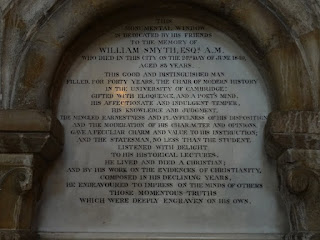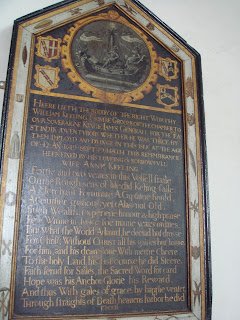We start at Dulverton in Somerset:
 It's to Humphrey Sydenham, M.P. for Exeter, "whose least honour was his descent from an ancient and worthy family, whose true glory was his uniform character in publick and private life. He was the most obedient son of the Church of England, the disinterested lover of his country, the lover of mankind; of integrity unshaken, in devotion constant, in good works abundant; the strict observer of himself, the candid judge of others; just, humane, beneficent in all relations, the steady patriot, the faithful husband, the affectionate father, the kind master, the generous friend; zealous without faction, pious without moroseness, cheerful with innocence, possessed of the esteem of good men who knew him, and careless of the applause or censure of bad ones. The rest of his history will be displayed in the presence of God, and Angels, and Men.
It's to Humphrey Sydenham, M.P. for Exeter, "whose least honour was his descent from an ancient and worthy family, whose true glory was his uniform character in publick and private life. He was the most obedient son of the Church of England, the disinterested lover of his country, the lover of mankind; of integrity unshaken, in devotion constant, in good works abundant; the strict observer of himself, the candid judge of others; just, humane, beneficent in all relations, the steady patriot, the faithful husband, the affectionate father, the kind master, the generous friend; zealous without faction, pious without moroseness, cheerful with innocence, possessed of the esteem of good men who knew him, and careless of the applause or censure of bad ones. The rest of his history will be displayed in the presence of God, and Angels, and Men.He gently fell asleep, after having served his generation sixty-three years, at his seat at Combe in Somersetshire, August 12 1757."
This account of his career doesn't quite agree on his being 'zealous without faction', but it's still a splendid epitaph.
As a would-be scholar, I was attracted by these memorials to two scholars, both from Norwich Cathedral (they're William Smyth and George Horne - but the wikipedia articles kind of spoil the effect of the epitaphs):

"This monumental window is dedicated by his friends to the memory of WILLIAM SMYTH, Esqr, A. M., who died in this city on the 24th day of June 1849, aged 83 years.
This good and distinguished man filled, for forty years, the Chair of Modern History in the University of Cambridge: gifted with eloquence, and a poet's mind, his affectionate and indulgent temper, his knowledge and judgment, the mingled earnestness and playfulness of his disposition and the moderation of his character and opinions, gave a peculiar charm and value to his instruction; and the statesman, no less than the student, listened with delight to his historical lectures. He lived and died a Christian, and by his work on the evidences of Christianity, composed in his declining years, he endeavoured to impress on the minds of others those momentous truths which were deeply engraved on his own."

"Sacred to the Memory of the Right Reverend GEORGE HORNE, D. D., Many Years President of Magdalen College in Oxford; Dean of Canterbury; and late Bishop of this Diocese. In whose Character, Depth of Learning, Brightness of Imagination, Sanctity of Manners, and Sweetness of Temper were united beyond the usual Lot of Mortality. With his Discourses from the Pulpit, his Hearers, Whether of the University, the City, or the Country Parish, were edified and delighted. His Commentary on the Psalms, will continue to be a Companion to the Closet, Till ye Devotion of Earth shall end in ye Hallelujahs of Heaven.
His Soul, having patiently suffered under such Infirmities, as seemed not due to his Years, took its flight from this vale of misery, To the unspeakable Loss of the Church of England, and his sorrowing Friends and Admirers; January 17th 1792 in the 62nd Year of his Age."
This is from West Stourmouth in Kent, one of my favourite churches:

Of Thomas Beake, who died ("suddenly, in the strictest sense being alive in health, and dead in the same moment") in 1734:
"He was a person truly beloved and esteemed for his many excellent virtues.
To his wives, ever-kind and affectionate.
To his relations, fond and beneficent.
To his neighbours, friendly, sincere and courteous.
To the truly-poor, humane and charitable.
To all just, good-natured, cheerful and obliging.
To his God, a faithful, humble devout servant,
One who took due pains to learn his duty;
He did more - he took care to practise it.
More might be said of him with justice, less could not,
Since envy must own:
He was a sweet-tempered, virtuous man
And good Christian."
A memorial to a doctor, from the enchanting, tiny, St Swithun-upon-Kingsgate in Winchester:
 William Widmore, who died in 1756:
William Widmore, who died in 1756:"He was (which is most rare)
A friend without guile
An apothecary without ostentation.
His extensive charity in his profession
Entitles him to be called
The Physician of the poor.
Let other inscriptions
Boast honours, pedigree, and riches,
Here lies an honest Englishman."
"Let other inscriptions boast honours, pedigree, and riches"; a sentiment shared by the person who composed this inscription, from Ash, in Kent:

For Joseph Westbeech, a captain in the Royal Navy, who died in 1811: "This memorial is erected by an affectionate brother, not with a view to record imaginary virtues, or display ostentatious grief, but as a tribute of his love, and with an earnest hope that a numerous progeny may be inspired by the Almighty Giver of all good, to imitate the example of a parent, whose life and amiable manners procured him general esteem, and whose death diffused universal sympathy and sorrow."
"Not with a view to record imaginary virtues"! Well, indeed.
In memory of an earlier sailor, an extraordinary seventeenth-century monument from Carisbrooke on the Isle of Wight:


"Heere lieth the boddy of the right worthy William Keeling Esquire Groome of the Chamber to our Soveraigne Kinge James Generall for the [Hon] East Indiae Adventurors whether he was th[r]ice by them imployd and dyinge in this isle at the age of 42 anno 1619 Sept 19 hath this remembrance heer fixed by his loveing & sorrowfull wife Anne Keeling.
Fortie and two yeares, in this Vessell fraile
On the Rough seas of life did Keling saile,
A Merchant Fortunate, A Captaine bould,
A Courtier gratious, yet (Alas) not Old.
Such Wealth, experiene, honour & high praise
Few Winne in Twice soe manie yeares or daies.
But what the World Admird, he deemd but drosse
For Christ; Without Christ all his gaines but losse.
For him, and his deare loue, With merrie Cheere
To the holy Land, his last course he did Steere.
Faith servd for Sailes, the Sacred Word for card
Hope was his Anchor, Glorie his Reward,
And thus with gales of grace, by happie venter,
Through straights of Deaths, heavens harbor he did Enter."
The person who painted this memorial really didn't know what he was doing - the last word is just squeezed in there, and look at the letters which had to be inserted in the fourth and fifth lines! The verse is utterly charming, though - "with gales of grace, by happy venture..."
And finally, a lawyer, from Bramfield in Suffolk:

To Lambert Nelson, who died in 1714:
"He was a man of bright parts, sound judgement, good breeding, and pleasant conversation, master of the learned languages and all the liberal arts, yet a very valuable and right honest attorney. He was second to none in the strokes of the pen or turns of wit, a true son of the Church and a conscientious subject of the crown of England, in either of which capacities, he was fit for any employment, had he been less reserved himself, or better known in time to any great minister whose height might expose him to the necessity of learning sometimes upon so steady a prop, and the bosom of so resolute a confidante."
Poor Lambert! It sounds like he was today what we call 'under-employed'. I wonder if it was his wife who thus lamented his failure to attain glory. 'A man of bright parts', though - what a great phrase.
Bramfield is a delightful church; I can't resist showing you a few pictures of it (there are more and better, with a history, here):



That's a late-medieval rood screen:

And this is where Lambert is buried:

A little less reserved, or a little bit better-connected, and he might have had a grander grave; but it's hard to imagine that Westminster Abbey itself could be a nicer resting-place.
No comments:
Post a Comment